新视野大学英语(第三版)读写教程第一册教案
- 格式:docx
- 大小:76.22 KB
- 文档页数:44
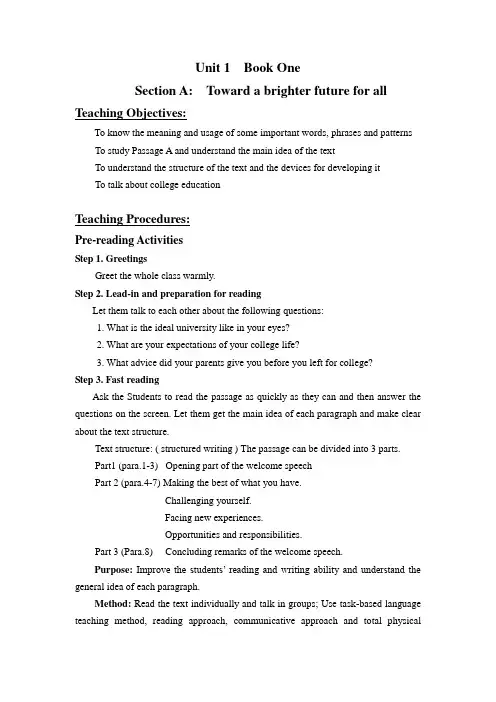
Unit 1 Book OneSection A: Toward a brighter future for all Teaching Objectives:To know the meaning and usage of some important words, phrases and patterns To study Passage A and understand the main idea of the textTo understand the structure of the text and the devices for developing itTo talk about college educationTeaching Procedures:Pre-reading ActivitiesStep 1. GreetingsGreet the whole class warmly.Step 2. Lead-in and preparation for readingLet them talk to each other about the following questions:1. What is the ideal university like in your eyes?2. What are your expectations of your college life?3. What advice did your parents give you before you left for college?Step 3. Fast readingAsk the Students to read the passage as quickly as they can and then answer the questions on the screen. Let them get the main idea of each paragraph and make clear about the text structure.Text structure: ( structured writing ) The passage can be divided into 3 parts.Part1 (para.1-3) Opening part of the welcome speechPart 2 (para.4-7) Making the best of what you have.Challenging yourself.Facing new experiences.Opportunities and responsibilities.Part 3 (Para.8) Concluding remarks of the welcome speech.Purpose: Improve the students’ reading and writing ability and understand the general idea of each paragraph.Method: Read the text individually and talk in groups; Use task-based language teaching method, reading approach, communicative approach and total physicalresponse method.Step 4. Preparation for details of the text on the screenStudents are required to look at the Words and Phrases on the screen and give a brief presentation in class.Words and Phrases:Purpose: Train the Students’ ability of unde rstanding and using foreign language.Method:Talk in groups, Use task-based language teaching method, communicative approach and total physical response method.1. (Para.1)pledge to do sth. 作保证,承诺China and the United states pledge to boost cooperation and exchange to ensure a better future for China-US ties.中美政府承诺将加强合作与交流以确保两国关系的未来更加美好。
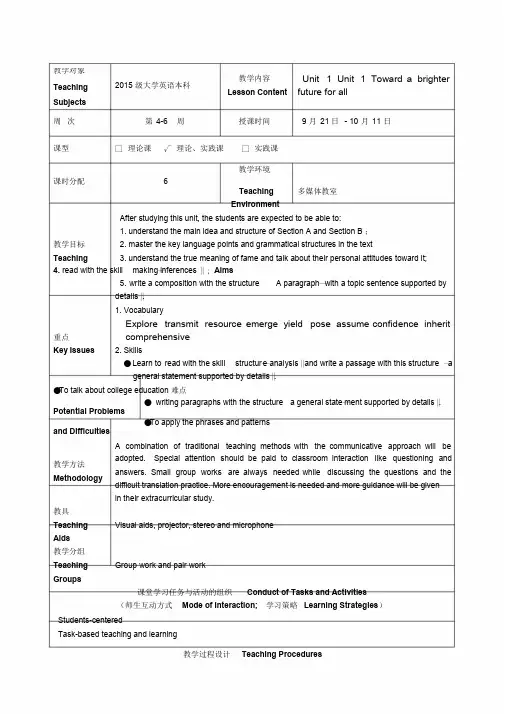
教学对象Teaching Subjects 2015 级大学英语本科教学内容Lesson ContentUnit 1 Unit 1 Toward a brighterfuture for all周次第4-6 周授课时间9 月21 日- 10 月11 日课型□理论课√理论、实践课□实践课教学环境课时分配 6Teaching 多媒体教室EnvironmentAfter studying this unit, the students are expected to be able to:1. understand the main idea and structure of Section A and Section B ;教学目标 2. master the key language points and grammatical structures in the textTeaching 3. understand the true meaning of fame and talk about their personal attitudes toward it;4. read with the skill making―inferences ‖; Aims5. write a composition with the structure A paragraph―with a topic sentence supported bydetails‖.1. VocabularyExplore transmit resource emerge yield pose assume confidence inherit 重点comprehensiveKey Issues 2. Skills●Learn to read with the skill structur―e analysis‖and write a passage with this structure ―ageneral statement supported by details‖.●To talk about college education 难点●writing paragraphs with the structure a general state―ment supported by details‖. Potential Problems●To apply the phrases and patternsand DifficultiesA combination of traditional teaching methods with the communicative approach will be教学方法Methodology a dopted. Special attention should be paid to classroom interaction like questioning and answers. Small group works are always needed while discussing the questions and the difficult translation practice. More encouragement is needed and more guidance will be givenin their extracurricular study.教具Teaching Visual aids, projector, stereo and microphoneAids教学分组Teaching Group work and pair workGroups课堂学习任务与活动的组织Conduct of Tasks and Activities (师生互动方式Mode of Interaction; 学习策略Learning Strategies)Students-centeredTask-based teaching and learning教学过程设计Teaching Procedures步骤1 Step 1 导入Lead-inI. Greeting and warming-up questions discussion.2. What is the ideal university like in your eyes?3. What are your expectations of your college life?II. Listening and discussing.6. Listening practice.7. What advice did your parents give you before you left for college?II. Listening to a passage and answer questions on page 2步骤2 Step 2课文学习Section A Toward a brighter future for allI. New words2.pledge to do sth.(pledge to /boost cooperation/exchange/China-US ties )中美政府承诺将加强合作与交流以确保两国关系的未来更加美好。
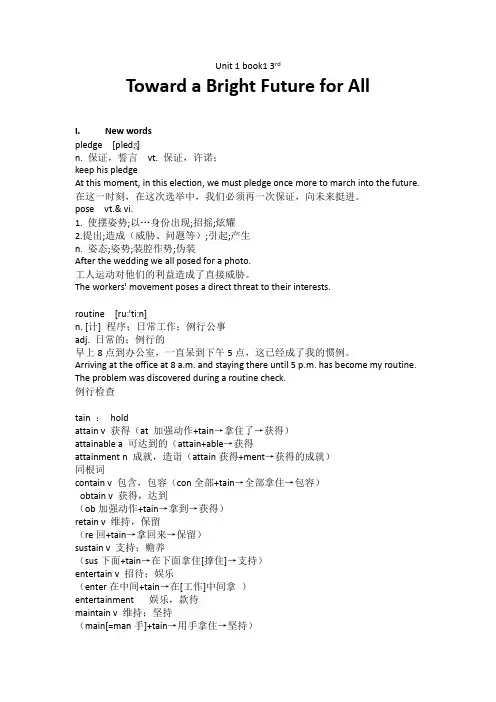
Unit 1 book1 3rdToward a Bright Future for AllI.New wordspledge [pledʒ]n. 保证,誓言vt. 保证,许诺;keep his pledgeAt this moment, in this election, we must pledge once more to march into the future. 在这一时刻,在这次选举中,我们必须再一次保证,向未来挺进。
pose vt.& vi.1. 使摆姿势;以…身份出现;招摇;炫耀2.提出;造成(威胁、问题等);引起;产生n. 姿态;姿势;装腔作势;伪装After the wedding we all posed for a photo.工人运动对他们的利益造成了直接威胁。
The workers' movement poses a direct threat to their interests.routine [ruː'tiːn]n. [计] 程序;日常工作;例行公事adj. 日常的;例行的早上8点到办公室,一直呆到下午5点,这已经成了我的惯例。
Arriving at the office at 8 a.m. and staying there until 5 p.m. has become my routine. The problem was discovered during a routine check.例行检查tain :holdattain v 获得(at 加强动作+tain→拿住了→获得)attainable a 可达到的(attain+able→获得attainment n 成就,造诣(attain获得+ment→获得的成就)同根词contain v 包含,包容(con全部+tain→全部拿住→包容)obtain v 获得,达到(ob加强动作+tain→拿到→获得)retain v 维持,保留(re回+tain→拿回来→保留)sustain v 支持;赡养(sus下面+tain→在下面拿住[撑住]→支持)entertain v 招待;娱乐(enter在中间+tain→在[工作]中间拿)entertainment 娱乐,款待maintain v 维持;坚持(main[=man手]+tain→用手拿住→坚持)maintenance n 维护;坚持comprehensive adj. 综合的;广泛的;有理解力的comprehensive evaluation综合评价,综合评价法comprehensive analysis综合分析fascinatingfascinate ['fæsineit] vt.1. (用个人的魅力、独特的能力等等)迷住;使着迷;使陶醉,使神魂颠倒:The actress's beauty fascinated everyone.2.使呆住,慑住…使动弹不得;蛊惑:Snakes are said to fascinate small animals.据说蛇能蛊惑小动物。
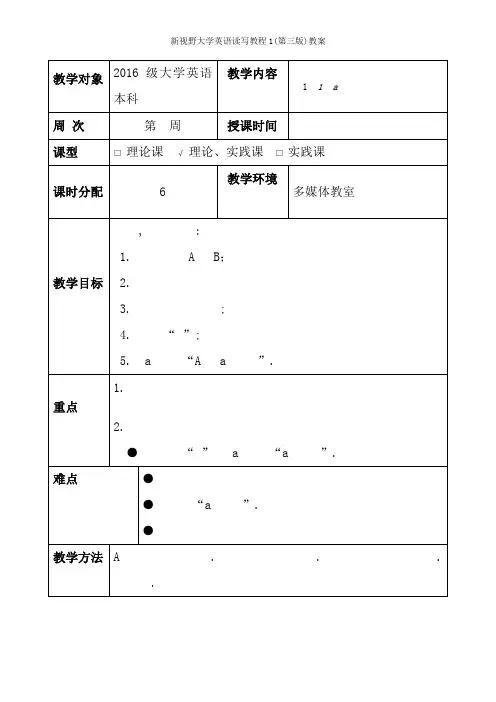
![新视野大学英语读写教程1[第三版]教学案](https://uimg.taocdn.com/cd77b67f69eae009581becb1.webp)
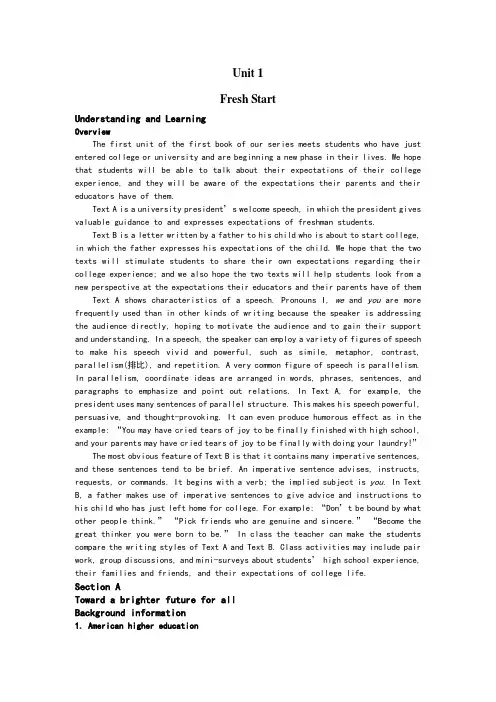
Unit 1Fresh StartUnderstanding and LearningOverviewThe first unit of the first book of our series meets students who have just entered college or university and are beginning a new phase in their lives. We hope that students will be able to talk about their expectations of their college experience, and they will be aware of the expectations their parents and their educators have of them.Text A is a university president’s welcome speech, in which the president gives valuable guidance to and expresses expectations of freshman students.Text B is a letter written by a father to his child who is about to start college, in which the father expresses his expectations of the child. We hope that the two texts will stimulate students to share their own expectations regarding their college experience; and we also hope the two texts will help students look from a new perspective at the expectations their educators and their parents have of them Text A shows characteristics of a speech. Pronouns I, we and you are more frequently used than in other kinds of writing because the speaker is addressing the audience directly, hoping to motivate the audience and to gain their support and understanding. In a speech, the speaker can employ a variety of figures of speech to make his speech vivid and powerful, such as simile, metaphor, contrast, parallelism(排比), and repetition. A very common figure of speech is parallelism. In parallelism, coordinate ideas are arranged in words, phrases, sentences, and paragraphs to emphasize and point out relations. In Text A, for example, the president uses many sentences of parallel structure. This makes his speech powerful, persuasive, and thought-provoking. It can even produce humorous effect as in the example: “You may have cried tears of joy to be finally finished with high school, and your parents may have cried tears of joy to be finally with doing your laundry!”The most obvious feature of Text B is that it contains many imperative sentences, and these sentences tend to be brief. An imperative sentence advises, instructs, requests, or commands. It begins with a verb; the implied subject is you. In Text B, a father makes use of imperative sentences to give advice and instructions to his child who has just left home for college. For example: “Don’t be bound by what other people think.”“Pick friends who are genuine and sincere.”“Become the great thinker you were born to be.” In class the teacher can make the students compare the writing styles of Text A and Text B. Class activities may include pair work, group discussions, and mini-surveys about students’high school experience, their families and friends, and their expectations of college life.Section AToward a brighter future for allBackground information1. American higher educationIn the United States, students can choose to go to college after high school. (They can also choose to go straight to the workforce after high school.) They have the option of attending a two-year community college before applying to a four-year university. Admission to community college is easier, tuition is lower, and class sizes are often smaller than at a university. Community college students can earn an associate agree and transfer up to two years of course credits to a university.College and university students need to pay tuition, but many earn scholarships or receive loans. Although admissions policies vary from one university to another, most determine admission based on several criteria, including a student’s high school course of study, high school Grade Point Average (GPA), participation in extracurricular activities, SAT(Scholastic Assessment Test) or ACT (American College Testing) exam scores, a written essay, and possibly a personal interview with a representative from the admissions office.Most students in the United States take the SAT Reasoning Test or the ACT during their final year of high school. Each university sets a minimum SAT or ACT score that a student must achieve in order to gain admission. These are standardized quantitative examinations. The SAT tests critical reading, mathematics, and writing skills, The ACT tests English, mathematics, reading, science reasoning, and includes an optional writing test.Extracurricular activities may include scholastic clubs, athletic teams, student government, and philanthropic clubs. Voluntary participation in these kinds of activities is an indication that a student has learned valuable life lessons, such as teamwork, leadership, or civic responsibility.University students pursuing a bachelor’s degree are called “undergraduates”; students pursuing a master’s or doctoral degree are called “graduate students”. Most universities give under graduate students a liberal education, which means students are required to take courses across several disciplines before they specialize in a major field of study. Graduate and professional programs, such as medicine or law, are specialized. All degree programs require students to complete a minimum number of credit hours before graduating.Selection for admission to a graduate program is based on several criteria. These include completion of a bachelor’s degree, the student’s undergraduate coursework and GPA. Students are also expected to write an essay as part of their application or to submit a writing sample. Most master’s programs require students to have a minimum score on the Graduate Record Examination (GRE), which tests verbal reasoning, quantitative reasoning, critical thinking, and analytical writing skills.Students continue to take course at the graduate level. A final thesis is required for most master’s programs. Doctoral students take course until they have earned enough credit hours to attempt their qualifying examinations. These are usually taken over several days and often include a written and oral component. After doctoral students pass their qualifying exams, they are advanced to candidacy and can begin writing their dissertation. Before the degree is given, the completed dissertation must be orally defended before the candidate’s faculty committee.2. Vera WangVera Wang is a Chinese-American fashion designer. She was born and raised in New York City. While trained as a figure skater in high school, she eventually earned a degree in art history from Sarah Lawrence College in 1971. But a career in fashion was her dream. She worked as a senior fashion editor for Vogue magazine for 15 years. In 1985, she left vogue and joined Ralph Lauren as a design director for two years. In 1990, she opened her own design salon in New York, and featured her trademark bridal gowns. Wang has made wedding gowns for many celebrities and public figures, such as Jennifer Lopez (詹尼佛·洛佩兹), Sharon Stone (莎朗·斯通) and Chelsea Clinton (切尔西·克林顿).Detailed study of the text1. Your achievement is the triumph of years of hard work, both of your own and of your parents and teachers. (Para. 1)Meaning:Your entering this university is an important success. This success is due to many years of your hard work, and many years of your parents’ and teachers’hard work.★triumph: n. [C] an important victory or success after a difficult struggle (尤指苦战后获得的)胜利,成功,成就Winning the championship was a great personal triumph for this young tennis player.赢得冠军对这个年轻的网球运动员来说是很大的个人成就。
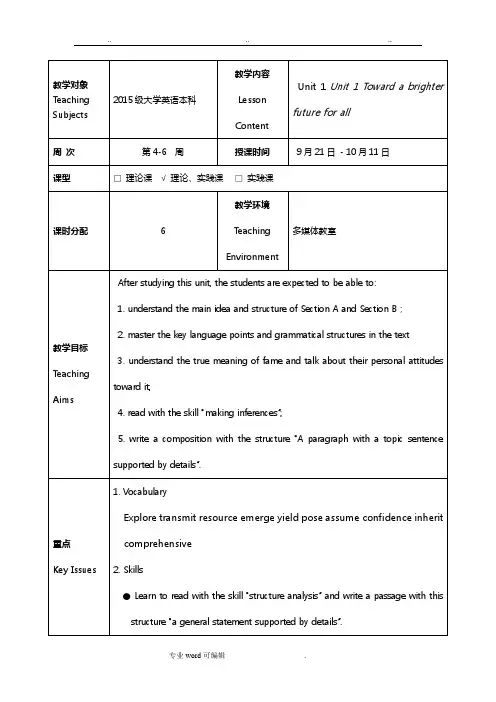
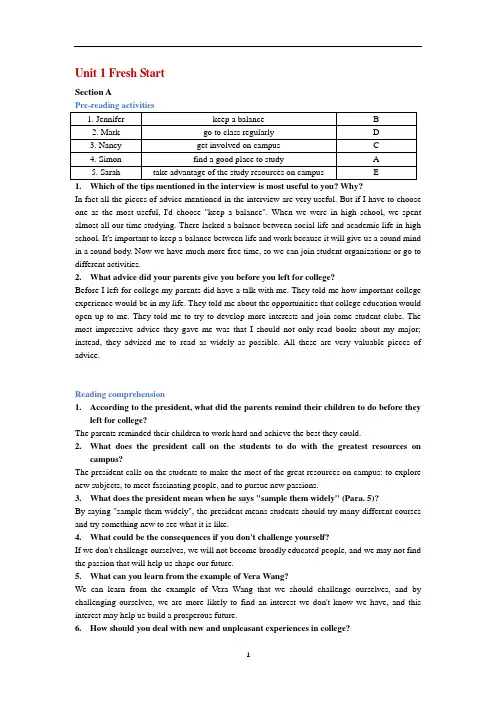
Unit 1 Fresh StartSection AIn fact all the pieces of advice mentioned in the interview are very useful. But if I have to choose one as the most useful, I'd choose "keep a balance". When we were in high school, we spent almost all our time studying. There lacked a balance between social life and academic life in high school. It's important to keep a balance between life and work because it will give us a sound mind in a sound body. Now we have much more free time, so we can join student organizations or go to different activities.2.What advice did your parents give you before you left for college?Before I left for college my parents did have a talk with me. They told me how important college experience would be in my life. They told me about the opportunities that college education would open up to me. They told me to try to develop more interests and join some student clubs. The most impressive advice they gave me was that I should not only read books about my major; instead, they advised me to read as widely as possible. All these are very valuable pieces of advice.Reading comprehension1.According to the president, what did the parents remind their children to do before theyleft for college?The parents reminded their children to work hard and achieve the best they could.2.What does the president call on the students to do with the greatest resources oncampus?The president calls on the students to make the most of the great resources on campus: to explore new subjects, to meet fascinating people, and to pursue new passions.3.What does the president mean when he says "sample them widely" (Para. 5)?By saying "sample them widely", the president means students should try many different courses and try something new to see what it is like.4.What could be the consequences if you don't challenge yourself?If we don't challenge ourselves, we will not become broadly educated people, and we may not find the passion that will help us shape our future.5.What can you learn from the example of Vera Wang?We can learn from the example of Vera Wang that we should challenge ourselves, and by challenging ourselves, we are more likely to find an interest we don't know we have, and this interest may help us build a prosperous future.6.How should you deal with new and unpleasant experiences in college?We should not worry, and we should learn to face this new part of our life with enthusiasm. College experiences, pleasant or unpleasant, will provide us with valuable lessons and will enrich our life.7.How do you understand "Now it is your turn" (Para. 7)?The expression "Now it is your turn" means that now it is time for you to acquire knowledge and to pass it on.8.How does the president's speech impress you?The president's welcoming speech is really impressive. He mentions many important things about college life, the resources available on campus, as well as the opportunities we have and the responsibilities that we should take. The speech is very inspiring.1. What role do you think a university education will play in your life?A university education will play a very important role in my life, and it will benefit me in a number of ways. In the university I can acquire specialized knowledge about my major, and develop my critical thinking and research skills. I will have the opportunities to meet and share ideas with people of different minds. I can gain a broader view of the world by meeting people from diverse backgrounds and cultures. And I will start my life journey of self-discovery, self-improvement, and self-fulfillment.2.Do you think a university education can change a person's life? In what way and why? Yes, absolutely. With a university education, a person will have more freedom and therefore more choices. This education experience provides unlimited potential. Moreover, a university education provides the means for one to succeed. Not only will a person obtain knowledge and skills essential for his career development, but he will also develop an independent mind and be able to make right decisions on his own.3.How do you think about those successful people such as Bill Gates who dropped out ofuniversity?I admire those who dropped out of university and yet had made fame for themselves by achieving big goals. Some people use those successful college dropouts as counterexamples to show their belief that a person can succeed even without a university education. Chances are that most people do not have the same mind, talent, determination, or opportunities as Bill Gates, Steve Jobs, and Mark Zuckerberg did; therefore, they might not be able to achieve success without having a university education. In fact, a university education will equip them with the necessary knowledge and skills which will help them to succeed.4.How do you understand the statement "If you think education is expensive, tryignorance"?Nowadays education is getting more and more expensive, especially college education. And there are people who choose to give up education because of the high cost. But without education, one would not be able to acquire knowledge that an education will offer. In other words, they would be "ignorant". The result would be that "ignorant" people will suffer even more or pay even more for being so. It is true that education is expensive, but if you try "ignorance", the cost would be even higher.5.What are you going to do at university in order to sample widely and challenge yourself? To sample widely and challenge myself, I am going to venture out of my comfort zone and do what I have not had the courage to do. For instance, I will make friends with people from diversebackgrounds and cultures. I will take a swimming class and learn how to swim. I will attend lectures, join student clubs, and try all kinds of food. Most of all, I will do whatever it takes to make the most of the four years and try to become a well-rounded graduate.Words in use1. Given the chance to show his ability, he regained (confidence) and began to succeed in school.2. It is so difficult to (explore) the bottom of the ocean because some parts are very deep.3. It was about 30 seconds before Alex (emerged) from the water; we were quite scared.4. We often (assume) that when other people do the same things as we do, they do them for the same reasons; but this assumption is not always reasonable.5. There is widespread concern that the rising unemployment may(pose)a threat to social stability.6. After a(n) (comprehensive) physical exam, my doctor said I was in good condition except that my blood pressure was a little high.7. It is well known that China is a country with rich natural (resources) and a very big population.8. Some people believe that the earth can (yield) enough food to support at least twice its present population.9. Sam (inherited) the gift of imagination from his family, but he lacked the driving power to take action.10. A bee that has found honey is able to (transmit) to other bees the information they need in order to collect the honey.Word building: Practiceun-cover ➝ 1)(uncover)easy ➝ 2)(uneasy)load ➝ 3)(unload)-antapply ➝ 4)(applicant)resist ➝ 5)(resistant)account ➝ 6)(accountant)assistant ➝ 7)(assist)-ifysimple ➝ 8)(simplify)note ➝ 9)(notify)quality ➝ 10)(qualify)class ➝ 11)(classify)1. Despite being (classified)as a meat-eater, the panda has a diet that is overwhelmingly vegetarian.2. They have developed computerized systems which will greatly (assist) all library users so that they will not need the help of others.3. Changes have been made to the construction requirements in this city in order to make the buildings and highways more (resistant) to earthquakes.4. After a two-month inquiry, the police have (uncovered)the three men's intention to rob a bank and have arrested them.5. Consumers say they are (uneasy) about using their credit cards over the Internet because they are afraid of Internet fraud (欺诈) and identity theft.6. A college degree and some working experience should (qualify) you for the job advertised in the newspaper.7. The British ship arrived at the port this morning and is (unloading) its contents in the harbor now.8. As a human resources manager, I see many job (applicants)who are technically skilled, but have bad attitudes.9. The teacher (simplified) his instructions so that the small children could understand him better.10. My major was literature. However, now I'm working in a firm as a(n) (accountant), dealing with numbers every day.11. The committee's decision will be (notified) to all employees next week.Banked clozeUniversity students come from different parts of the country with various purposes. However, a closer look at their reasons for studying at the university will enable us to 1)(classify)them roughly into three groups: those who have a(n) 2)(passion)for learning, those who wish to 3)(attain) a bright future, and those who learn with no definite purpose.Firstly, there are many students who learn simply because they 4)(pursue) their goal of learning. Some read a wealth of British and American novels because they are keenly interested in literature. Others sit in front of the computer screen, working on a new program, 5)(virtually) day and night, because they find some computer programs 6)(fascinating), and they dream of becoming a "Bill Gates" one day.Secondly, there are students who work hard mainly for a better and more 7)(prosperous) future. It seems that the majority of students fall into this group. After admission to the university, they read books after books to 8)(acquire) knowledge from all of the resources which are 9)(available) to them, and finally, to succeed in the future job market.Thirdly, there are still some students who learn without a clear goal. They take courses, finish homework, enjoy life on campus, but don't want to 10)(sample)anything new or challenging. They have no idea what they will be doing after college. And they may end up with nothing in their lives.Expressions in use1. My family 1)(got by) on my father's unemployment benefit after he lost his job.2. Many subway riders read books or listen to music in order to 2)(make the most of) their time on the way to work.3. In order to make sure he would be able to attend the meeting, I called him up two weeks 3)(in advance).4. Experts say our company is amazing in that sales have been increasing steadily 4)(over time).5. In order to 5)(reap the benefits of) the physical exercise, you have to exercise regularly, and for at least half an hour each time.6. They all tried to talk 6)(all at once), but I couldn't hear anything they said.7. Yellow flowers in the field always 7)(remind) me 8)(of) my childhood in the countryside.8. We have been practicing for so long and so hard that our team should 9)(stand a chance of) winning the game.9. Research on genes will 10)(open the door to) exciting new medical treatments.10. Every one of you has made a contribution and I 11)(take pleasure in)acknowledging what each of you has done to make this academic convention such a success.Structure analysis: PracticeA B B CStructured writing: PracticeThere are some things you can do to succeed in college. First, pursue passions. Your passions will broaden your mind and make your life interesting. Second, never let go of any opportunities that come your way. College is full of unique opportunities, which will enable you to sample new things and meet wonderful people. Lastly, take responsibilities. In college you must learn to be responsible for your own decisions and actions. With the passions, the opportunities, and the ability to take responsibilities, you will become successful not only in college, but also in your future career.Translation苏格拉底是古希腊哲学家,被誉为现代西方哲学的奠基人。
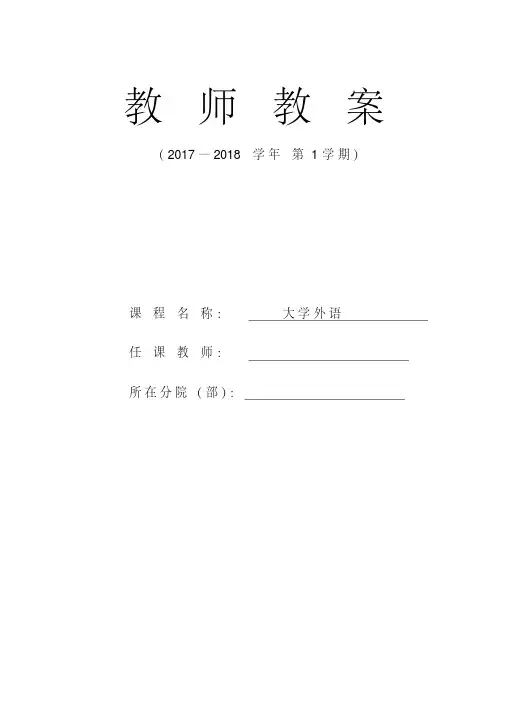
教师教案(2017—2018 学年第1学期)课程名称:大学外语任课教师:所在分院(部):Unit 1, Book OneSection A: Toward a brighter future for all Teaching Objectives:To know the meaning and usage of some important words, phrases and patterns To study Passage A and understand the main idea of the textTo understand the structure of the text and the devices for developing itTo talk about college educationTeaching Procedures:Pre-reading ActivitiesStep 1. GreetingsGreet the whole class warmly.Step 2. Lead-in and preparation for readingLet them talk to each other about the following questions:1. What is the ideal university like in your eyes?2. What are your expectations of your college life?3. What advice did your parents give you before you left for college?Step 3. Fast readingAsk the Students to read the passage as quickly as they can and then answer the questions on the screen. Let them get the main idea of each paragraph and make clear about the text structure.Text structure: ( structured writing ) The passage can be divided into 3 parts.Part1 (para.1-3) Opening part of the welcome speechPart 2 (para.4-7) Making the best of what you have.Challenging yourself.Facing new experiences.Opportunities and responsibilities.Part 3 (Para.8) Concluding remarks of the welcome speech.and writing ability and understan d the Purpose: Improve the students’ readinggeneral idea of each paragraph.Method: Read the text individually and talk in groups; Use task-based language teaching method, reading approach, communicative approach and total physicalresponse method.Step 4. Preparation for details of the text on the screenStudents are required to look at the Words and Phrases on the screen and give a brief presentation in class.Words and Phrases:ability of understandi n g and using foreign Purpose: Train the Students’ language.Method:Talk in groups, Use task-based language teaching method, communicative approach and total physical response method.1. (Para.1)pledge to do sth. 作保证,承诺China and the United states pledge to boost cooperation and exchange to ensure a better future for China-US ties.中美政府承诺将加强合作与交流以确保两国关系的未来更加美好。
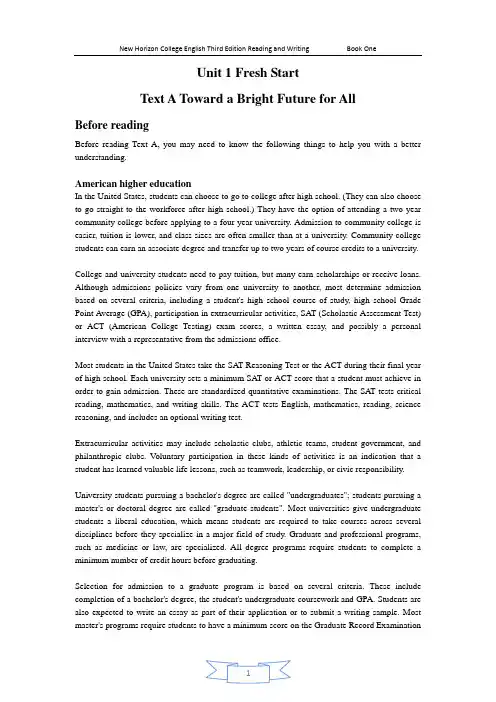
Unit 1 Fresh StartText A Toward a Bright Future for AllBefore readingBefore reading Text A, you may need to know the following things to help you with a better understanding.American higher educationIn the United States, students can choose to go to college after high school. (They can also choose to go straight to the workforce after high school.) They have the option of attending a two-year community college before applying to a four-year university. Admission to community college is easier, tuition is lower, and class sizes are often smaller than at a university. Community college students can earn an associate degree and transfer up to two years of course credits to a university.College and university students need to pay tuition, but many earn scholarships or receive loans. Although admissions policies vary from one university to another, most determine admission based on several criteria, including a student's high school course of study, high school Grade Point Average (GPA), participation in extracurricular activities, SAT (Scholastic Assessment Test) or ACT (American College Testing) exam scores, a written essay, and possibly a personal interview with a representative from the admissions office.Most students in the United States take the SAT Reasoning Test or the ACT during their final year of high school. Each university sets a minimum SAT or ACT score that a student must achieve in order to gain admission. These are standardized quantitative examinations. The SAT tests critical reading, mathematics, and writing skills. The ACT tests English, mathematics, reading, science reasoning, and includes an optional writing test.Extracurricular activities may include scholastic clubs, athletic teams, student government, and philanthropic clubs. V oluntary participation in these kinds of activities is an indication that a student has learned valuable life lessons, such as teamwork, leadership, or civic responsibility.University students pursuing a bachelor's degree are called "undergraduates"; students pursuing a master's or doctoral degree are called "graduate students". Most universities give undergraduate students a liberal education, which means students are required to take courses across several disciplines before they specialize in a major field of study. Graduate and professional programs, such as medicine or law, are specialized. All degree programs require students to complete a minimum number of credit hours before graduating.Selection for admission to a graduate program is based on several criteria. These include completion of a bachelor's degree, the student's undergraduate coursework and GPA. Students are also expected to write an essay as part of their application or to submit a writing sample. Most master's programs require students to have a minimum score on the Graduate Record Examination(GRE), which tests verbal reasoning, quantitative reasoning, critical thinking, and analytical writing skills.Students continue to take courses at the graduate level. A final thesis is required for most master's programs. Doctoral students take courses until they have earned enough credit hours to attempt their qualifying examinations. These are usually taken over several days and often include a written and oral component. After doctoral students pass their qualifying exams, they are advanced to candidacy and can begin writing their dissertation. Before the degree is given, the completed dissertation must be orally defended before the candidate's faculty committee.Vera WangVera Wang (王薇薇, 1949- ) is aChinese-American fashion designer. Shewas born and raised in New York City.While trained as a figure skater in highschool, she eventually earned a degree in arthistory from Sarah Lawrence College in1971. But a career in fashion was her dream.She worked as a senior fashion editorfor Vogue magazine for 15 years. In 1985,she left Vogue and joined Ralph Lauren as adesign director for two years. In 1990, she opened her own design salon in New York, and featured her trademark bridal gowns. Wang has made wedding gowns for many celebrities and public figures, such as Jennifer Lopez (珍妮弗•洛佩兹), Sharon Stone (莎朗•斯通) and Chelsea Clinton (切尔西•克林顿).Detailed study of the textPara.1. Good afternoon! As president of the university, I am proud to welcome you to this university. Your achievement is the triumph of years of hard work, both of your own and of your parents and teachers. Here at the university, we pledge to make your educational experience as rewarding as possible.下午好!作为校长,我非常自豪地欢迎你们来到这所大学。
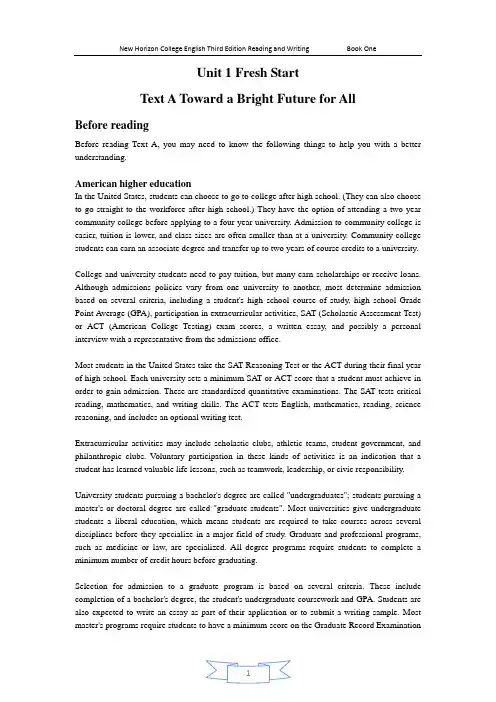
Unit 1 Fresh StartText A Toward a Bright Future for AllBefore readingBefore reading Text A, you may need to know the following things to help you with a better understanding.American higher educationIn the United States, students can choose to go to college after high school. (They can also choose to go straight to the workforce after high school.) They have the option of attending a two-year community college before applying to a four-year university. Admission to community college is easier, tuition is lower, and class sizes are often smaller than at a university. Community college students can earn an associate degree and transfer up to two years of course credits to a university.College and university students need to pay tuition, but many earn scholarships or receive loans. Although admissions policies vary from one university to another, most determine admission based on several criteria, including a student's high school course of study, high school Grade Point Average (GPA), participation in extracurricular activities, SAT (Scholastic Assessment Test) or ACT (American College Testing) exam scores, a written essay, and possibly a personal interview with a representative from the admissions office.Most students in the United States take the SAT Reasoning Test or the ACT during their final year of high school. Each university sets a minimum SAT or ACT score that a student must achieve in order to gain admission. These are standardized quantitative examinations. The SAT tests critical reading, mathematics, and writing skills. The ACT tests English, mathematics, reading, science reasoning, and includes an optional writing test.Extracurricular activities may include scholastic clubs, athletic teams, student government, and philanthropic clubs. V oluntary participation in these kinds of activities is an indication that a student has learned valuable life lessons, such as teamwork, leadership, or civic responsibility.University students pursuing a bachelor's degree are called "undergraduates"; students pursuing a master's or doctoral degree are called "graduate students". Most universities give undergraduate students a liberal education, which means students are required to take courses across several disciplines before they specialize in a major field of study. Graduate and professional programs, such as medicine or law, are specialized. All degree programs require students to complete a minimum number of credit hours before graduating.Selection for admission to a graduate program is based on several criteria. These include completion of a bachelor's degree, the student's undergraduate coursework and GPA. Students are also expected to write an essay as part of their application or to submit a writing sample. Most master's programs require students to have a minimum score on the Graduate Record Examination(GRE), which tests verbal reasoning, quantitative reasoning, critical thinking, and analytical writing skills.Students continue to take courses at the graduate level. A final thesis is required for most master's programs. Doctoral students take courses until they have earned enough credit hours to attempt their qualifying examinations. These are usually taken over several days and often include a written and oral component. After doctoral students pass their qualifying exams, they are advanced to candidacy and can begin writing their dissertation. Before the degree is given, the completed dissertation must be orally defended before the candidate's faculty committee.Vera WangVera Wang (王薇薇, 1949- ) is aChinese-American fashion designer. Shewas born and raised in New York City.While trained as a figure skater in highschool, she eventually earned a degree in arthistory from Sarah Lawrence College in1971. But a career in fashion was her dream.She worked as a senior fashion editorfor Vogue magazine for 15 years. In 1985,she left Vogue and joined Ralph Lauren as adesign director for two years. In 1990, she opened her own design salon in New York, and featured her trademark bridal gowns. Wang has made wedding gowns for many celebrities and public figures, such as Jennifer Lopez (珍妮弗•洛佩兹), Sharon Stone (莎朗•斯通) and Chelsea Clinton (切尔西•克林顿).Detailed study of the textPara.1. Good afternoon! As president of the university, I am proud to welcome you to this university. Your achievement is the triumph of years of hard work, both of your own and of your parents and teachers. Here at the university, we pledge to make your educational experience as rewarding as possible.下午好!作为校长,我非常自豪地欢迎你们来到这所大学。
Unit 1Fresh StartUnderstanding and LearningOverviewThe first unit of the first book of our series meets students who have just entered college or university and are beginning a new phase in their lives. We hope that students will be able to talk about their expectations of their college experience, and they will be aware of the expectations their parents and their educators have of them.Text A is a university president’s welcome speech, in which the president gives valuable guidance to and expresses expectations of freshman students.Text B is a letter written by a father to his child who is about to start college, in which the father expresses his expectations of the child. We hope that the two texts will stimulate students to share their own expectations regarding their college experience; and we also hope the two texts will help students look from a new perspective at the expectations their educators and their parents have of themText A shows characteristics of a speech. Pronouns I, we and you are more frequently used than in other kinds of writing because the speaker is addressing the audience directly, hoping to motivate the audience and to gain their support and understanding. In a speech, the speaker can employ a variety of figures of speech to make his speech vivid and powerful, such as simile, metaphor, contrast, parallelism(排比), and repetition. A very common figure of speech is parallelism. In parallelism, coordinate ideas are arranged in words, phrases, sentences, and paragraphs to emphasize and point out relations. In Text A, for example, the president uses many sentences of parallel structure. This makes his speech powerful, persuasive, and thought-provoking. It can even produce humorous effect as in the example: “You may have cried tears of joy to be finally finished with high school, and your parents may have cried tears of joy to be finally with doing your laundry!”The most obvious feature of Text B is that it contains many imperative sentences, and these sentences tend to be brief. An imperative sentence advises, instructs, requests, or commands. It begins with a verb; the implied subject is you.In Text B, a father makes use of imperative sentences to give advice and instructions to his child who has just left home for college. For example: “Don’t be bound by what other people think.”“Pick friends who are genuine and sincere.”“Become the great thinker you were born to be.”In class the teacher can make the students compare the writing styles of Text A and Text B. Class activities may include pair work, group discussions, and mini-surveys about students’high school experience, their families and friends, and their expectations of college life.Section AToward a brighter future for allBackground information1. American higher educationIn the United States, students can choose to go to college after high school. (They can also choose to go straight to the workforce after high school.) They have the option of attending a two-year community college before applying to a four-year university. Admission to communitycollege is easier, tuition is lower, and class sizes are often smaller than at a university. Community college students can earn an associate agree and transfer up to two years of course credits to a university.College and university students need to pay tuition, but many earn scholarships or receive loans. Although admissions policies vary from one university to another, most determine admission based on several criteria, including a student’s high school course of study, high school Grade Point Average (GPA), participation in extracurricular activities, SAT(Scholastic Assessment Test) or ACT (American College Testing) exam scores, a written essay, and possibly a personal interview with a representative from the admissions office.Most students in the United States take the SAT Reasoning Test or the ACT during their final year of high school. Each university sets a minimum SAT or ACT score that a student must achieve in order to gain admission. These are standardized quantitative examinations. The SAT tests critical reading, mathematics, and writing skills, The ACT tests English, mathematics, reading, science reasoning, and includes an optional writing test.Extracurricular activities may include scholastic clubs, athletic teams, student government, and philanthropic clubs. V oluntary participation in these kinds of activities is an indication that a student has learned valuable life lessons, such as teamwork, leadership, or civic responsibility.University students pursuing a bachelor’s degree are called “undergraduates”; students pursuing a master’s or doctoral degree are called “graduate students”. Most universities give under graduate students a liberal education, which means students are required to take courses across several disciplines before they specialize in a major field of study. Graduate and professional programs, such as medicine or law, are specialized. All degree programs require students to complete a minimum number of credit hours before graduating.Selection for admission to a graduate program is based on several criteria. These include completion of a bachelor’s degree, the student’s undergraduate coursework and GPA. Students are also expected to write an essay as part of their application or to submit a writing sample. Most master’s programs require students to have a minimum score on the Graduate Record Examination (GRE), which tests verbal reasoning, quantitative reasoning, critical thinking, and analytical writing skills.Students continue to take course at the graduate level. A final thesis is required for most master’s programs. Doctoral students take course until they have earned enough credit hours to attempt their qualifying examinations. These are usually taken over several days and often include a written and oral component. After doctoral students pass their qualifying exams, they are advanced to candidacy and can begin writing their dissertation. Before the degree is given, the completed dissertation must be orally defended before the candidate’s faculty committee.2. Vera WangVera Wang is a Chinese-American fashion designer. She was born and raised in New York City. While trained as a figure skater in high school, she eventually earned a degree in art history from Sarah Lawrence College in 1971. But a career in fashion was her dream. She worked as a senior fashion editor for Vogue magazine for 15 years. In 1985, she left vogue and joined Ralph Lauren as a design director for two years. In 1990, she opened her own design salon in New York, and featured her trademark bridal gowns. Wang has made wedding gowns for many celebrities and public figures, such as Jennifer Lopez (詹尼佛·洛佩兹), Sharon Stone (莎朗·斯通) and Chelsea Clinton (切尔西·克林顿).Detailed study of the text1. Your achievement is the triumph of years of hard work, both of your own and of your parents and teachers. (Para. 1)Meaning: Your entering this university is an important success. This success is due to many years of your hard work, and many years of your parents’ and teachers’ hard work.★triumph: n. [C] an important victory or success after a difficult struggle (尤指苦战后获得的)胜利,成功,成就Winning the championship was a great personal triumph for this young tennis player.赢得冠军对这个年轻的网球运动员来说是很大的个人成就。
opportunity to face new exciting experience and to challenge themselves so that they will reap the benefits of their college years. The president also expresses the university’s expectations of its students and of the responsibilities they carry.Part I (Para. 1-3): The president congratulates students on their achievement and reminds students of the fact that their current success was due to their own and their parents’ efforts, and that their future is built on a solid foundation of the past.Part II (Para. 4-7): The president offers students comprehensive advice on how to make the most of their four college years and makes them realize the university’s expectations and their own responsibilities.Part III (Para. 8): The students are called upon to cherish the opportunity and to bear in mind their responsibilities as citizens of their communities, their country and the world.b. Structure of the textOpening part of the welcome speechAdviceConcluding partc. Summary of the textLanguage focusPledge to do sth. : China and the United states pledge to boost cooperation and exchange to ensure a better future for China-US ties.Make the most of sth.: This article introduces 7 tips for making the most of your iPhone5S.Reap the benefits: Keep on reading extensively, and you will reap the benefits sooner or later.Feel overwhelmed by sth.: Nowadays, many young people feel overwhelmed by the fierce competition in the job market.Stand chance of: Animals stand little chance of survival under such extreme weather. Take great pleasure in: He always takes great pleasure in lending a helping hand topeople around him.Open the door to sth.: These useful suggestions open the door to better communication with your parents.3. Language applicationa. writing deviceSentence writingParallelism:By placing two or more ideas of equal value in the same grammatical form enables us to express these ideas clearly and emphatically.Example: You may have cried tears of joy to be finally finished with high school; your parents may have cried tears of joy to be finally finished with doing your laundry!Paragraph writing: topic - details - conclusionExample:For you, these next four years will be a time unlike any other. (Topic sentence) Here you are surrounded by great resources: interesting students from all over the country, a learned and caring faculty, a comprehensive library, great sports facilities, and student organizations covering every possible interest from the arts to science, to community service and so on. (Detail 1: What is available to you on campus) You will have the freedom to explore and learn about new subjects. You will learn to get by on very little sleep, meet fascinating people, and pursue new passions. (Detail 2: What you can do) I want to encourage you to make the most of this unique experience, and to use your energy and enthusiasm to reap the benefits of this opportunity. (Concluding sentence)Activities performed in class:Do you think a university education can change a person’s life? In what way and why?How do you think of those successful people such as Bill Gates who dropped out of university?What are you going to do at university in order to sample widely and challenge yourself?1.Warming-up activities for Section A (0.5 period)Let them have a surveySurvey: How close are you and your parents?Check (√) the statements which are true for you.I have been missing my parents a lot since I left for college.I often chat with my parents.I like sharing my joys and sorrows with my parents.I always remember my parents’ birthdays.I know about my parents’ hobbies.My parents allow me to make my own decisions.。
Unit 1Fresh StartUnderstanding and LearningOverviewThe first unit of the first book of our series meets students who have just entered college or university and are beginning a new phase in their lives. We hope that students will be able to talk about their expectations of their college experience, and they will be aware of the expectations their parents and their educators have of them.Text A is a university president’s welcome speech, in which the president gives valuable guidance to and expresses expectations of freshman students.Text B is a letter written by a father to his child who is about to start college, in which the father expresses his expectations of the child. We hope that the two texts will stimulate students to share their own expectations regarding their college experience; and we also hope the two texts will help students look from a new perspective at the expectations their educators and their parents have of themText A shows characteristics of a speech. Pronouns I, we and you are more frequently used than in other kinds of writing because the speaker is addressing the audience directly, hoping to motivate the audience and to gain their support and understanding. In a speech, the speaker can employ a variety of figures of speech to make his speech vivid and powerful, such as simile, metaphor, contrast, parallelism(排比), and repetition. A very common figure of speech is parallelism. In parallelism, coordinate ideas are arranged in words, phrases, sentences, and paragraphs to emphasize and point out relations. In Text A, for example, the president uses many sentences of parallel structure. This makes his speech powerful, persuasive, and thought-provoking. It can even produce humorous effect as in the example: “You may have cried tears of joy to be finally finished with high school, and your parents may have cried tears of joy to be finally with doing your laundry!”The most obvious feature of Text B is that it contains many imperative sentences, and these sentences tend to be brief. An imperative sentence advises, instructs, requests, or commands. It begins with a verb; the implied subject is you.In Text B, a father makes use of imperative sentences to give advice and instructions to his child who has just left home for college. For example: “Don’t be bound by what other people think.”“Pick friends who are genuine and sincere.”“Become the great thinker you were born to be.”In class the teacher can make the students compare the writing styles of Text A and Text B. Class activities may include pair work, group discussions, and mini-surveys about students’high school experience, their families and friends, and their expectations of college life.Section AToward a brighter future for allBackground information1. American higher educationIn the United States, students can choose to go to college after high school. (They can also choose to go straight to the workforce after high school.) They have the option of attending a two-year community college before applying to a four-year university. Admission to communitycollege is easier, tuition is lower, and class sizes are often smaller than at a university. Community college students can earn an associate agree and transfer up to two years of course credits to a university.College and university students need to pay tuition, but many earn scholarships or receive loans. Although admissions policies vary from one university to another, most determine admission based on several criteria, including a student’s high school course of study, high school Grade Point Average (GPA), participation in extracurricular activities, SAT(Scholastic Assessment Test) or ACT (American College Testing) exam scores, a written essay, and possibly a personal interview with a representative from the admissions office.Most students in the United States take the SAT Reasoning Test or the ACT during their final year of high school. Each university sets a minimum SAT or ACT score that a student must achieve in order to gain admission. These are standardized quantitative examinations. The SAT tests critical reading, mathematics, and writing skills, The ACT tests English, mathematics, reading, science reasoning, and includes an optional writing test.Extracurricular activities may include scholastic clubs, athletic teams, student government, and philanthropic clubs. V oluntary participation in these kinds of activities is an indication that a student has learned valuable life lessons, such as teamwork, leadership, or civic responsibility.University students pursuing a bachelor’s degree are called “undergraduates”; students pursuing a master’s or doctoral degree are called “graduate students”. Most universities give under graduate students a liberal education, which means students are required to take courses across several disciplines before they specialize in a major field of study. Graduate and professional programs, such as medicine or law, are specialized. All degree programs require students to complete a minimum number of credit hours before graduating.Selection for admission to a graduate program is based on several criteria. These include completion of a bachelor’s degree, the student’s undergraduate coursework and GPA. Students are also expected to write an essay as part of their application or to submit a writing sample. Most master’s programs require students to have a minimum score on the Graduate Record Examination (GRE), which tests verbal reasoning, quantitative reasoning, critical thinking, and analytical writing skills.Students continue to take course at the graduate level. A final thesis is required for most master’s programs. Doctoral students take course until they have earned enough credit hours to attempt their qualifying examinations. These are usually taken over several days and often include a written and oral component. After doctoral students pass their qualifying exams, they are advanced to candidacy and can begin writing their dissertation. Before the degree is given, the completed dissertation must be orally defended before the candidate’s faculty committee.2. Vera WangVera Wang is a Chinese-American fashion designer. She was born and raised in New York City. While trained as a figure skater in high school, she eventually earned a degree in art history from Sarah Lawrence College in 1971. But a career in fashion was her dream. She worked as a senior fashion editor for Vogue magazine for 15 years. In 1985, she left vogue and joined Ralph Lauren as a design director for two years. In 1990, she opened her own design salon in New York, and featured her trademark bridal gowns. Wang has made wedding gowns for many celebrities and public figures, such as Jennifer Lopez (詹尼佛·洛佩兹), Sharon Stone (莎朗·斯通) and Chelsea Clinton (切尔西·克林顿).。
教师教案(2017—2018 学年第1学期)课程名称:大学外语任课教师:所在分院(部):Unit 1, Book OneSection A: Toward a brighter future for all Teaching Objectives:To know the meaning and usage of some important words, phrases and patterns To study Passage A and understand the main idea of the textTo understand the structure of the text and the devices for developing itTo talk about college educationTeaching Procedures:Pre-reading ActivitiesStep 1. GreetingsGreet the whole class warmly.Step 2. Lead-in and preparation for readingLet them talk to each other about the following questions:1. What is the ideal university like in your eyes?2. What are your expectations of your college life?3. What advice did your parents give you before you left for college?Step 3. Fast readingAsk the Students to read the passage as quickly as they can and then answer the questions on the screen. Let them get the main idea of each paragraph and make clear about the text structure.Text structure: ( structured writing ) The passage can be divided into 3 parts.Part1 (para.1-3)Opening part of the welcome speechPart 2 (para.4-7) Making the best of what you have.Challenging yourself.Facing new experiences.Opportunities and responsibilities.Part 3 (Para.8)Concluding remarks of the welcome speech.Purpose: Improve the students’ reading and writing ability and understand the general idea of each paragraph.Method: Read the text individually and talk in groups; Use task-based language teaching method, reading approach, communicative approach and total physicalresponse method.Step 4. Preparation for details of the text on the screenStudents are required to look at the Words and Phrases on the screen and give a brief presentation in class.Words and Phrases:Purpose: Train the Students’ ability of understanding and using foreign language.Method:Talk in groups, Use task-based language teaching method, communicative approach and total physical response method.1. (Para.1)pledge to do sth. 作保证,承诺China and the United states pledge to boost cooperation and exchange to ensure a better future for China-US ties.中美政府承诺将加强合作与交流以确保两国关系的未来更加美好。
2. (Para.2) remind sb. of sb. /sth.1) make sb. remember sb. that they know or sth. that happened in the past. 使某人想起某人某事The song always reminds me of our holiday in Mexico. 那首歌总让我想起我们在墨西哥的那次假期。
2)be very similar to sb. or sth. else 是某人想起(相似的)人或事Nancy was tall and slim, and reminded me of my cousin Sarah.3. (Para.2)reminder: n. [C] sth. that makes you notice, remember, or think about sth. 起提醒作用的东西The cold served as a reminder that winter wasn’t quite finished. 寒冷的天气提醒人们冬天还没有过去。
4. (Para.3)attain:vt.(fml.)succeed in achieving sth. after trying for a long time. 得到;获得;赢得Not all athletes attain this standard of physical fitness. 并非所有的运动员都能达到这种身体素质水平。
5. (Para.3) foundation:n. [ C] the most basic part of sth. from which the rest of it develops 基础The course gives students a solid foundation in English writing skills. 这门课为学生的英语写作能力打下了坚实的基础。
6. (Para.4) facility:n. (~ies) [pl.] rooms, equipment, or services that are provided for a particular purpose (为某种目的而提供的)设施,设备The hotel has an indoor swimming pool and other leisure facilities. 这家宾馆有室内游泳池和其他休闲设施。
7. (Para.4) fascinating:a. making you very interested attracted 吸引人的;迷人的;使人神魂颠倒的He is such a great writer that his stories are always fascinating.他是个了不起的作家,他写的故事总是引人入胜。
8. (Para.4) make the most of充分利用This article introduces 7 tips for making the most of your iPhone5S.这篇文章向你介绍iPhone5S手机的7个使用小窍门。
9. (Para.4)reap the benefits 受益,得享好处Keep on reading extensively, and you will reap the benefits sooner or later.继续广泛阅读,你会受益的。
10. (Para.5)feel overwhelmed by. 不知所措Nowadays, many young people feel overwhelmed by the fierce competition in the job market.现如今,激烈的竞争让许多年轻人不知所措。
11. (Para.5) assume: vt. Think that sth. is true, although you do not have definite proof 假定;假设;认为I assume that every college student has access to the Internet.我以为每个大学生都可以使用互联网。
12. (Para.5)stand a chance of有机会,有希望Animals stand little chance of survival under such extreme weather.在这种极端天气下动物很难存活。
13. (Para.5) unsuspected: a. existing without your knowledge 未知的;未被想到的14. take pleasure in doing sth.乐于做某事He always takes great pleasure in lending a helping hand to people around him.他总是乐于向周围的人伸出援助之手。
15. open the door to sth.打开方便之门These useful suggestions open the door to better communication with your parents.这些实用的建议为你更好地与父母交流敞开方便之门。
Step 5: While-reading ActivitiesLanguage Points:1. Your achievement is the triumph of years of hard work, both of your own and of your parents and teachers. (Para. 1)Meaning: Your entering this university is an important success. This success is due to many years of your hard work, and many years of your parents’ and teachers’ hard work.2. In welcoming you to the university, I am reminded of my own high school graduation and the photograph my mom took of my dad and me. (Para. 2) Meaning: When I am welcoming you to this university, something I remember is my own high school graduation and the photo my mom took of my dad and me.3. But know this:The future is built on a strong foundation of the past. ( Para. 3) Meaning: But you should know that your future success can only be attained when it is built on a solid past.4. For you, these next four years will be a time unlike any other. (Para.4) Meaning: For you, the next four years in university will be different from any other period of time in your life.5. You may feel overwhelmed by the wealth of courses available to you. (Para. 5) Meaning: When facing the large number of courses that you can take at college, you may not know how to choose.6. You will not be able to experience them all, but sample them widely! (Para. 5) Meaning: You will not be able to take all the courses, but try as many different courses as possible to see what they are like.7. So, with a glow in your eye and a song in your heart, step forward to meet these new experiences! (Para. 6)Meaning: Therefore, with the excitement and enthusiasm that I know you must have in your heart, I encourage you to go forward from here and face this new part of your life!8. A wise man said: “Education is simply the soul of a society as it passes from one generation to another.” (Para. 7)Meaning: A wise man said that education is truly the spirit and heart of a society because it passes from generation to generation.9. Now it is your turn. (Para. 7)Meaning: Now it is time for you to acquire knowledge and pass it on.10. We take great pleasure in opening the door to this great step in your journey. We take delight in the many opportunities which you will find, and in the responsibilities that you will carry as citizens of your communities, your country, and the world. (Para.8 )Meaning: We are very happy to open the door to this next great step in your journey. We are delighted that you will find many different opportunities and many responsibilities, which you will shoulder as citizens of your communities, your country, and the world.Step 6: Typical patterns:Purpose: Further understand the text (Train further reading ability)to find out some difficult sentences and details of the text.Method:Read the text together; Use task-based language teaching method, reading approach, communicative approach, grammar-translation approach and total physical response method.Typical patterns:1 . As president of the university, I am proud to welcome you to this university.作为校长,我非常自豪地欢迎你们来到这所大学。